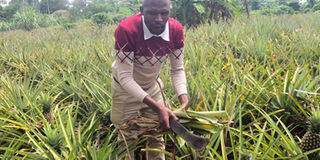Nuwagaba makes gift bags from fibre

Samuel Nuwagaba collects pineapple leaves which he dries and mixes with banana fibre.
What you need to know:
Samuel Nuwagaba has proved that Uganda is not only gifted by nature, but also innovative minds and technologies that could help people become richer without destroying the environment, writes Edgar R. Batte.
Samuel Nuwagaba runs an enterprise called Sam’s Paper Production which makes packaging bags from dry and fresh banana fibres, maize stork and pineapple crowns or leaves.
He works with Uganda Industrial Research Institute (UIRI), a government institute that carries out scientific and industrial research to improve skills and capacity of local entrepreneurs.
Helping hand
The institute is, therefore, helping Nuwagaba do research on improving his skill set on usage of the organic materials.
“We do not use chemicals but starch in making the bags. I mainly supply my product to tour and travel companies. Paper bags made out of recycled materials are relatively new on the Ugandan market. People mainly use the kaveera (polythene bag) to carry items after shopping or around,” Nuwagaba explains.
Efforts of young entrepreneurs like him deserve applause for availing alternatives to the kaveera which visually litters the environment and accumulate in the soils since it is non-bio gradable.
Consequently, this contributes blockage of trenches and drainage channels, contributing to flooding.
In making bags from organic or natural fibres, Nuwagaba is happy to relate with tour operators.
Nurtures dream
His original dream was to work in the tourism sector. “I did not realise my dream because my family could not support me in school, so I dropped out. I am a Senior Six leaver. I started thinking of a project I could embark on in order to identify with the tourism sector,” the youthful businessman explains.
Starts making bags
When he started making the bags, he needed clients to support and enable him sustain his enterprise, so he took sample to Uganda Tourism Board (UTB) which embraced his idea and connected him to UIRI for training.
“When I saw what he was doing, I was impressed and decided to support him so that he would be encouraged to grow his idea,” said Samuel Mugisha of Bic Tours and Travel.
Nuwagaba is currently undergoing mentorship on an incubation programme at the institute to improve his product.
“That is how I have been able to produce well branded bags. I have gone through a number of trainings. So far, I supply bags to different companies. I am particularly grateful to Samuel Mugisha who liked my products and has since connected me to companies to buy and support my initiative,” the paper bag maker explains.
Inspiration
He adds that he has realised that visits to agricultural sites for example the pineapple agro tourism activities in Luweero have been eye opening because he never thought that pineapple crown can also serve the purpose of being woven as a raw material for making bags.
He would like to work with Sulmah Foods Limited, an agro processing company in Luweero, working with farmers, so that he can use the raw material of pineapple leaves to boost his production levels. When he introduced the idea, in the presence of Sulmah Food’s director, Abdul Karim, ideas came up.
“How about us (Sulmah) producing for you the paper? If you take us through the process, you can be able to come and pick ready paper here and use it to manufacture the bags,” suggested Karim.
He added that Sulmah could go into an agreement and work out modalities with Samuel Paper Production so that Nuwagaba can have ready paper as opposed to carrying the bulk of pineapple crowns.
“We have the banana fibres and have the crowns from pineapples. If the opportunity is there, we can work out a win-win situation. We have the raw material and the place to process it,” says Karim.
At the moment, Nuwagaba fetches the raw materials from rural areas and gardens.
His market
Nuwagaba supplies bags to craft shops around Kampala and its suburbs. “People dealing in crafts like the paper packaging because it is environmentally friendly. Many are not into using kaveera. I get orders and supply the product. The challenge is that I am manually producing the bags which consumes a lot of time.”
When he gets the banana fibres, he sorts them at his place and boils them. He then transports the fibre to UIRI where it is crushed into pulp on machine. There is another machine that turns the fibre into paper for formation. He sells to ordinary clients and resellers. He sells a standard bag at Shs2,000 to bulk buyers and for between Shs3,000 and Shs5,000 to retail buyers. He customises the products to suit the needs and preferences of clients. His biggest sale thus far has been from Bunyonyi Safaris, a tour and travel company, to which he sold 2,000 bags which earned him Shs4m.
He has been in business for two years so far. “The challenge is marketing the product. Many Ugandans still prefer using the kaveera. I have to convince people into appreciating my product. The cost of production is also high. To produce one bag I spend between Shs800 and Shs1,000. I employ two people with whom I collect the fibres, clean and cook,” he further explains. His future plan is to start a paper company that can recycle with a chain of machines that can make paper bags to meet the expectation of clients with big orders.
At the moment, his capacity is limited given the low capacity and manual methods. If realised, his dream is to supply the region and perhaps the continent at one time.




